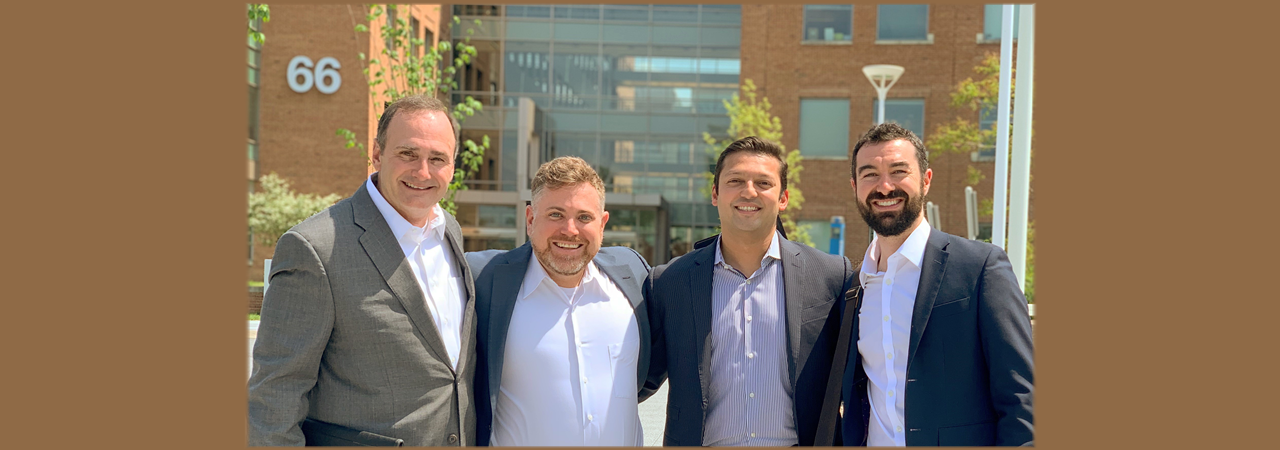Startup produces treatment to spur bone growth
Patients who need to regrow bone after surgery or injury could someday find help from a startup born and nurtured in the SUNY system. Zetagen Therapeutics, based in Syracuse, has developed a medical device that quickly stimulates the growth of high-quality bone.
The invention emerged from research conducted at SUNY Upstate Medical University by Zetagen’s co-founders, Bryan Margulies, PhD, and Nikhil Thakur, MD, while both were assistant professors there. Margulies now serves as Zetagen’s chief scientific officer (CSO). Thakur is Zetagen’s president and director of the Spine Center at Lawrence General Hospital in Lawrence, Mass.
Since 2017, Zetagen has operated from laboratory space in the Central New York Biotech Accelerator (CNYBAC), a business incubator owned and operated by SUNY Upstate. “It’s become a very collaborative arrangement between our company and the Accelerator,” Margulies says.
Zetagen’s bone growth agent is a small molecule—a chemically-derived substance—that triggers stem cells to transform into bone cells. At SUNY Upstate, Margulies and Thakur generated data on this molecule, published a paper on their work and filed for a patent.
They formed Zetagen (initially under a different name) in 2015. The company recently completed a $5.34 million Series A funding round. It has also received two grants, totaling $525,000, from the National Institutes of Health’s Small Business Innovation Research (SBIR) program. “That means two different parts of the National Institutes of Health (NIH) have reviewed our technology and given us a certain level of validation that it is meritorious from a scientific standpoint,” Margulies says.
Along with the growth-stimulating molecule, Zetagen has developed a bioceramic bone graft material to apply the product where needed. “We came up with a way to take our drug component, which is a liquid, and mix it with a dry component,” Margulies says. “In a relatively short time it becomes a material that looks and handles like bread dough, which you can pack into a surgical space.”
Zetagen expects to see demand for its product among spinal surgeons, who will use it to promote healing after a procedure. “Often, those patients have other health problems that make bone formation a bit more of a challenge,” Margulies says. The molecule could also be used to promote bone growth after a tooth extraction, and to improve the healing of complex bone fractures.
In addition, animal tests show that Zetagen’s product inhibits tumor growth and might be able to kill tumors altogether. If that application proves out, the product could be helpful after surgery to remove a metastasized or primary tumor in bone. “We would be able to prevent new tumor growth while repairing the bone adjacent to where the surgical excisions took place,” Margulies says.
Having developed a prototype of its product, Zetagen is now working with manufacturing partners to scale up production. “We anticipate having medical grade products this summer and then starting an early human feasibility study,” Margulies says.
The road to regulatory approval is always long and arduous, but Zetagen could get some help in streamlining the process. The U.S. Food and Drug Administration (FDA) has invited the company to apply to its Breakthrough Devices Program, which offers greater flexibility and access to the FDA during the review process. If accepted into this program, Zetagen also will find it easier than usual to get a billing code within the Medicare/Medicaid system, Margulies says.
In addition, Zetagen is applying for class III device classification from Health Canada, which could accelerate regulatory approval in that country.
As Zetagen works to commercialize the product, its location in the Biotech Accelerator offers a variety of benefits, such as access to essential core equipment. “These are things that would be expensive for a small company to keep, such as -80o C freezers, and a 3D printer that we’ve used a lot for fast prototyping,” Margulies says.
SUNY College of Environmental Science and Forestry was an early supporter of the CNYBAC programs and provided a grant to purchase the facility’s initial shared equipment.
Companies in the CNYBAC can ask for specific equipment, and if other tenants need those items, too, the facility will invest in them, says Kathi Durdon, executive director of the Central New York Biotech Accelerator. A Stratasys 3D printer and wash station were added through support from an Empire State Development grant and housed in the CNYBAC Creation Garage, which is sponsored in part through a National Grid grant.
Startups in the Biotech Accelerator can also gain expert assistance through access to SUNY Upstate faculty, and to specialists in areas such as FDA submissions and intellectual property concerns.
Zetagen started in a collaborative, shared wet lab space within the Biotech Accelerator and then expanded into its own, full lab of more than 900 square feet as its technology and funding progressed, Durdon says. “It’s very exciting, what Zetagen is doing. We particularly like to see technology that was initiated in a university setting translated into the market.”
comments powered by Disqus


